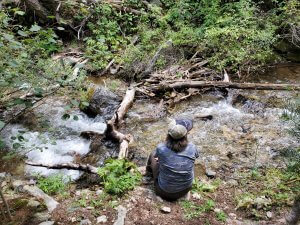Lori Altebaumer's Blog, page 4
December 8, 2022
The Christmas Tree: A Symbol of Hope

A few years ago, I decided to use some alone time to put up my Christmas tree. It sounded like a good idea. I could play Christmas music and really take my time.
I failed to take into consideration that it would be my first time in the last twenty years to decorate the tree without my daughter. As is right and proper, she married and moved away, tending her own house, and creating her own Christmas traditions and memories. But still, decorating without her seemed completely wrong.
As I unpacked the ornaments we had collected throughout the years, I was reminded of that day that twenty years ago when I went into labor while decorating our Christmas tree. The twins as they became known, arrived soon after. They came home from the hospital in Christmas stockings. I was in no rush as I examined the ornaments that warm, pudgy, often sticky hands had made, wondering where the time had gone. It goes by so fast, you know.
It was then it dawned on me what a beautiful gift the Christmas tree is.
There are many theories as to how Christmas trees came to be. Some believe the practice began in long before Christianity when people would place the evergreens in their homes to symbolize their hope that spring would come soon… or to ward off witches and ghosts..
Hope for new life? That sounds like something else that came from a tree. It was a different kind of tree that our Savior hung upon, but from it sprouted new life—a life eternal for all who accept it. A symbol of a pagan culture, reclaimed by the Good News and transformed into a sign of promise.
Another legend says the custom was started by Martin Luther when he fell in love with the beauty of a snow-covered tree beneath the starry sky as he walked through the woods. He brought it home and decorated it with candles which he lit in honor of Christ’s birth.
For me, it doesn’t matter how the custom started. I’m thankful for what it means to me now.
“He Himself bore our sins in His body on the tree, that we might die to sin and live to righteousness.” 1 Peter 2:24 ESV
For the wages of sin is death, but the gift of God is eternal life in Christ Jesus our Lord. Romans 6:23 ESV
...but God shows his love for us in that while we were still sinners, Christ died for us. Romans 5:8 ESV
In Scripture, the word tree was often used to mean a wooden cross like the one upon which Jesus crucified. Jesus bore the punishment for our sins on a tree—a wooden cross—so that we might have eternal life.
I believe that’s why we chose the evergreen tree to celebrate the Messiah’s birth. Evergreen means always green, always alive, which reminds us that as Christians, we too have been born again in Christ to be ever alive—evergreen. It is a beautiful symbol of what Christ did for us on the bare wooden branches of a cross.
What Satan meant for evil, Christ turned into good (see Genesis 15:20). What better reminder than an evergreen tree?
What about the ornaments we hang on these evergreen boughs? Ornaments are defined as things that lend to or enhance the beauty of something. Some may choose to elaborately decorate their trees with matching ornaments, all focused on a certain aesthetic or theme. These trees are often stunning to behold.
But that’s not the way I do it. Our tree is a snapshot of our life. Years of love and laughter, hard times and good times all come together in the branches of our evergreen tree. Ornaments made by tiny hands and too much glue. Ornaments passed down in our family or given by friends. Ornaments that commemorate special occasions like our first Christmas as husband and wife, the year our twins were born, and the trip we took to Rome. Ornaments that represent some of our favorite things. Ornaments that fill our hearts with sweet memories and remind us that God is faithful and good.
A lemon, a submarine, and a blue ball with tiny fingers covered in white paint to look like snowmen are just a few of the things that adorn my tree. In the same way this eclectic gathering decorate the tree, memories made with my husband, the gift of life-long friendships, and the wonders of being a parent adorn my life.
The ornaments on my tree represent much of what is beautiful in my life, and so much that I am thankful for. (You can check out what I shared about my most treasured gifts here.)
For me, the Christmas tree is a sacred thing—an evergreen reminder of my eternal life bought on a completely different kind of tree, a life made beautiful by the ornaments of grace and mercy, unfailing love and unmerited blessings.
I’d love to hear from you:
What special ornaments do you have on your tree and what memories do the recall?
What is your favorite way to decorate your tree, and why?
The post The Christmas Tree: A Symbol of Hope appeared first on Lori Altebaumer.
November 15, 2022
Priorities, Interruptions, and the Joy of the Holidays

‘Tis the season… well almost anyway. And already we are feeling the pinch in our pocketbooks, calendars, and possibly our state of mental well-being. Time to define our priorities and ban those pesky interruptions. Only then will we reap the full joy of the holidays.
Or will we?
Perhaps God has a different idea for our priorities and the interruptions that are sure to come.
When you reap the harvest of your land, you shall not wholly reap the corners of your field, nor shall you gather the gleanings of your harvest. And you shall not glean your vineyard, nor shall you gather every grape of your vineyard, you shall leave them for the poor and the stranger: I am the Lord your God. Leviticus 19:9-10
Few people make their living by farming these days, but that doesn’t mean we are without fields to tend and harvests to glean. For certain, we have fields of finances, families, and friendships. And we also have the field of time—and that’s the one I want us to consider now.
The ads for new day planners and calendars that will help us maximize our productivity by mapping out the details of our days are out in full force. If we want to schedule our lives to the second, there is no end to the beautifully illustrated and intricately designed devices that can help us do that. If we are determined to “wholly reap the corners” of our field call time, there is nothing to stop us. Nothing except for these instructions from God found in Leviticus.
Let’s start with a look at our holiday plans.
Christmas parties, decorating, shopping, gift wrapping, baking, family gatherings—if we have an unused nook or cranny of time, there is always something with which we can fill it.
And as soon as we do here come the interruptions.
A friend calls because she is feeling lonely or depressed. Do we have time for an unhurried, take all the time we need visit?
A neighbor gets sick. Do we have time to take them a meal, do their shopping, or help clean their house?
And can we do it with a sense of joy? That is the true test of our heart.
If we’re going to care for the poor and the stranger, the widow and the orphan, the certain man who fell among thieves who robbed him and left him half dead (see Luke 10:3-36), then we’ve got to leave something worth harvesting in the corners of our fields—our calendars.
The worst-case scenario, we end up with some unfilled free time. It doesn’t mean we have nothing to do, that we are being wasteful… unless we use it to binge watch Netflix or scroll through funny cat videos.
It gives us the chance be the interruption we would have previously wished to avoid. Take a meal to a sick friend or a new set of parents. Offer to babysit for the family who is foster parenting. Make a hot cup of tea and call an old friend just to check on them. Grocery shop for someone who can’t get out, then take time to visit as you deliver. Walk around town handing out candy canes and prayers.
The holidays are a wonderful time of year, but they are also a hard time for many people.
Boaz knows something about leaving a little something in his fields. In the Book of Ruth, he left some grain in his fields to be gleaned by the poor. One of those happened to be a widow named Ruth, who became his wife (see Ruth 2).
And together they became the ancestors of King David, and ultimately the line through which our Savior, Jesus Christ, was born.
All because there was a field “not wholly” reaped.
This year I’m prioritizing the interruptions. I’m leaving space in the margins and holes to the agenda. I’m not reaping the corners of my calendar. Instead, let me share the fruit of my time with others and my harvest may be one of joy.
I want to see them not as unwanted interruptions, but as divine opportunities to be the hands and feet of Christ—to be a vessel through which God may pour out His blessings on another.
Yes, I want to use my time wisely, but what could be wiser than to make myself available to be used by God?
Share your thoughts and join the conversation:
What are the things or activities that are the hardest to say no to or let go of so that you find margin in your holidays?
What do you see as the benefit to keeping “the corners of your calendar” from being time fully reaped?
What priorities can you set so that you can embrace the interruptions?
The post Priorities, Interruptions, and the Joy of the Holidays appeared first on Lori Altebaumer.
November 1, 2022
Identity

Now when the tempter came to Him, he said, “If You are the Son of God, command these stones to become bread.” Matthew 4:3
The Customs and Border Protection officer looked at the passport in her hand, then looked up at me. She stared, then looked back at the passport. This cycle repeated itself for an uncomfortable amount of time. I had never considered what happens when my identity is identity is doubted and me passport is denied, but I was afraid I was about to find out.
To be honest, it was four in the morning and I’d been up for nearly twenty four hours after ten days of non-stop touring in Israel while fighting a sinus infection. I probably didn’t look much like the appropriately-groomed, smiling person in the picture anymore.
But never had my identity been subject to this much scrutiny.
Perhaps no one understands having one’s identity questioned better than Jesus.
It was the first thing Satan attacked when Jesus began His ministry on earth. After forty days and nights without food, Jesus was hungry. Satan used this in his attempt to thwart Jesus’ mission. He wasn’t just appealing to the hunger of His flesh. He was tempting Jesus’ pride with the words if you are the Son of God.
If you are…
Satan wasn’t asking if you are because he didn’t know. He knew exactly who Jesus was. He wanted to see if Jesus would give up His rightful identity to satisfy his hungry, weak, and weary flesh—or worse, to react out of pride. Pride had been Satan’s downfall when he wanted to be God. Now he mistakenly thought he could sway Jesus to act in pride and do the same. (How thankful we are that he was wrong!)
Unfortunately, Satan’s defeat in his game of “If-then” with Jesus didn’t convince him to quit playing. He’s just chosen a different target—us.
And to our great detriment, we play along.
Have any of these thoughts gone through your mind?
If I was a true Christian, then I wouldn’t still have those thoughts. If I was a better parent, then my child wouldn’t be turning from God or in trouble at school. If I was a better spouse, then we wouldn’t fight so much, the house would be clean, the yard well-groomed, and the bank account full.If I can do enough good works, then I can be forgiven and worthy of heaven.When our thought starts with an if and end in a negative feeling about who we are, we need to stop and consider the source. God’s questions for us don’t include the word “if” when it comes to our identity.
When we accept Jesus as our Lord and Savior, God statements for us are “you are.”
You are a child of God and heir with Christ (see Romans 8:16-17). You are being transformed into the image of God (see 2 Corinthians 5:18). You are more than conquerors (see Romans 8:37). You are redeemed (see Luke 1:68).And the list goes on. God can answer all our if-then statements with His Word.
Satan doesn’t want us to know who we are, and he will make us question our identity through his lies and deceptions.
Like Satan’s targeted attack on Jesus, he’ll come at us most when we are hungry, exhausted, stressed, anxious, depressed, or uncertain, so we should start by understanding where we are most vulnerable.
We hold onto the truth by taking every question we have about who we are and who we are meant to be to the One who created us.
I once heard it said that in the marketing world, there are only two people who get to name something—the one who made it and the one who bought it.
No matter how worn out, bedraggled, and frazzled we look, when we arrive at Heaven’s Gate, St. Peter will not be there questioning our identity like the Customs officer questioned mine.

Please join the conversation by sharing what “if” are you most vulnerable to? Which Scripture have you found to be the most reaffirming when your “ifs” come?
Be challenged to search Scripture for God’s truth in response to every “if-then” you have believed.
The post Identity appeared first on Lori Altebaumer.
October 18, 2022
That’s Not the Way We Do It

“My thoughts are not your thoughts, nor are your ways My ways,” says the Lord (Isaiah 55:8).
This could have been my high school algebra teacher speaking to me. I remember him handing me my graded paper and announcing in front of the class. “Steele…” (he was also a weight-lifting coach so last names were the rule), “…I have no idea how you do it. You never work the problem the way you’re supposed to, but you always get the right answer.” His unstated point was there’s a way things should be done for getting the right results, and there’s the “that’s not the way we do it” strategy I seemed to prefer.
(*So no one gets the wrong impression, it didn’t stick. I couldn’t solve an algebra problem now to save my life.)
I took it as a compliment with no small measure of pride, though clearly Coach was, at the least perplexed, and perhaps a bit annoyed. Thankfully, I grew up in the days when students were still free to think outside of the narrow guidelines and formulas that students today are often forced to follow (but that’s a conversation for another time…).
GOD DOESN’T NEED OUR FORMULAS FOR SUCCESSWhen it comes to biblical examples of doing things the way we aren’t supposed to, there may be no better example than Gideon (see Judges 6 and 7). Gideon was an Israelite living under the oppressive rule of the Midianites. In fact, he was hiding in a wine press (a hole in the ground) to thresh wheat so the Midianites wouldn’t find him (There was a reason people didn’t thresh wheat in a winepress. Read about threshing floors here).
Now God was about to do something about their lowly situation.
But He wasn’t going to pull out the worldly playbook of successful strategies for defeating one’s enemies. God was about to do the exact opposite of everything that made sense for winning a war.
GOD HAS A BETTER PLANFirst, God chose Gideon to lead the people. Gideon was from the least of the tribes of Judah, and he was the least of his family. If God had asked the Israelites for a list of their top candidates for the position, Gideon would have been fortunate to have made the team as a water boy. No one goes to the least of the least when they are looking for a man to lead them into battle.
Still God chose him, and much to Gideon’s probable surprise and relief, he found himself surrounded by an army of thirty-two thousand Israelites. That must have sounded encouraging. Gideon might not be much but with an army of that size, maybe the Israelites still had a fighting chance.
Then God told Gideon his army was too big. Through a series of tests, He cut Gideon’s army down to three hundred men. Not ideal, but perhaps these where a group of elite fighting men with state-of-the-art weaponry—a sort of ancient Israel version of the Special Forces.
But again, God said no. Instead, He instructed Gideon to send the men into battle with only torches, clay pots, and trumpets.
That was definitely not in the rule book for ways to win battle against an army that was bigger and stronger than Gideon’s small fighting force.
There were thousands of years of history to prove that’s not the way wars are won!
Those watching were surely shaking their heads in defeat. Can you imagine all the advice Gideon was receiving that sounded a lot like, “You are going to fail. You’ll be the disgrace of the nation if you try this harebrained idea. That’s not the way we do it”?
And yet it was exactly the way God did it.
FAITH BRINGS THE VICTORYOnly their faith in God could have propelled these men into such a battle thus armed. Faith in God and a belief that He could and would make a way for Israel’s success. The night before the battle, He gave Gideon a glimpse of His strategy by allowing him to overhear a conversation happening in the Midianite camp. What Gideon heard surely must have been an encouragement to him (see Judges 7:7-18).
Unfortunately, God doesn’t give most of us the opportunity to see behind the scenes at what He is doing to prepare for our successes. How could our faith be grow if He did? Most of the time, we don’t know what God’s doing on the other side of the battle we’re fighting.
What He has given us, though, is the example of Gideon and the faith to trust that He is working all things for our good.
For we know that all things work together for good to those who love God, to those who are the called according to His purpose (Romans 8:28).
Through faith we can turn away from worldly formulas for success (a success which the world also wants to define for us). Only then will we see what God is capable of doing on our behalf.
OUR MARCHING ORDERSI experience this daily in my writing life. If I had a penny for every “you have to do it this way” piece of advice—well, let’s just say I wouldn’t need to worry about those royalties anymore.
Why do we do this to ourselves and to each other?
Why do we do it to God?
I’m not advising us to do it our way.
I’m saying that if God suggests something different, we should probably take heed. Be willing to take the road less traveled… or do it the way less done.
When God is your Commander in Chief, don’t be afraid to send the army home and march into battle with a clay pot.
When we do, we’ll be giving God the glory for what only He can do. After all, isn’t that the victory we aspire to?
What are some of the places where you feel stuck in the “that’s not the way it’s done” argument? Why do you feel that way? What might God be doing “behind the scenes” that you can’t see?
The post That’s Not the Way We Do It appeared first on Lori Altebaumer.
October 3, 2022
The First Duty of Love

Hear, O Israel: The Lord our God, the Lord is one! You shall love the Lord your God with all your heart, with all your soul, and with all your strength. Deuteronomy 6:4-5 NIV
All? It doesn’t take much self-examination to know my all isn’t quite what it should be.
I love the Lord with most of my heart… the majority of my heart… the most important parts of my heart. But ALL…how is that even possible? Is there really anything I’ve given my all to?
It’s not as if I purposefully determine to give only some of my heart to God—as if I wake up say “God, you can have it all…except for that little part right over there.”
I want to love God with all my heart, soul, and strength. But I also struggle with removing the rubbish and taking out the trash that stands in my way.
THERE IS A WAYAs I contemplated this verse, the word all kept demanding my attention. It was during this same time a certain quote kept showing up in front of me (I have a friend who calls those “sneaky Jesus” moments).
The first duty of love is to listen. ~Paul Tillich
Hear, O Israel…
Before I’m commanded to love God with all my heart, soul, and strength, I’m commanded to listen.
Hear, O Israel…
The opening word hear is translated from the Hebrew word Shema. This verse in Deuteronomy 6 is known as the Shema, a sacred prayer of the Jewish people and a declaration of their faith in God.
The word used here doesn’t mean to hear as we might passively scan the chatter at the coffee shop or listen with only half our attention while we’re busy with another task. The word means to listen attentively, to hear as though receiving a command.
I was never great at the monkey bars as a child. The only thing I ever got out of this particular form of playground torture was blistered palms and skinned knees. But this is what I think of when I consider the kind of hearing God calls us to in this verse. We look across the expanse and a closer relationship with God waiting for us on the other side.
To cross the monkey bars and get to the other side, we must swing from bar to bar, reaching for and taking hold of each one until we reach the safety that awaits us on the opposite side. But the farther we go, the weaker our muscles become. Holding on becomes more difficult and we feel our fingers slipping. To fall means scraped knees and elbows and a failure to reach the prize at the other side. If we’re lucky, a stronger friend may come along and help us at our weakest moment. But too often our grip slips and we fall to the gritty ground beneath us in defeat.
For me this is a picture of God calling Hear, O Lori…
With purpose (and at least a little courage), I must reach for and take hold of each word, grasping each one tightly and holding on as though my life depends upon it. I move from one to the next, slowly making my way across the framework of His message to reach the prize of His truth, understanding, or insight. But as I go, my mental strength may wane, my focus slipping. Oh, but that’s when I know I do have a stronger friend who will help me—Jesus Christ. In fact, that’s exactly when I may find it’s been Him carrying me across the entire time. I just had to first realize my inadequacy before I could see His arms supporting me.
Mr. Tillich, the theologian, must have gotten it right when he said the first duty of love is to listen.
WHAT DOES JESUS SAY?When asked what the greatest commandment was, Jesus recited this verse in Mark 12:28-30, starting with “Hear O, Israel.”
If love demands I first listen, then loving with all my heart, soul, and strength must start with listening with all my being—fully attentive, engaged, and focused. No passively scanning as I read and study God’s Word or half-hearted attention in my times of prayer and worship. Read my blog about why regular Bible reading is important here.
As a human made of weak and easily sidetracked flesh, putting all my heart, soul, and strength into anything will likely be an unreachable goal, no matter how hard I try. Thankfully, Jesus has paid the price of my sin—covering inability to follow this command in my own strength—so I can live, not under the condemnation of my failure, but under the conviction to guard my all.
And I guard my all by hearing.
The more I listen to God, hearing His words, the less of my heart is filled with worldly distractions. The fewer of these distractions I allow in my heart, the more I fill my heart with the things of God. I find that as I am filled more and more with the love of God and the truth of His Word, the all of my heart, soul, and strength grows greater.
Loving God with all my heart, soul, and strength starts by first hearing.
No blistered palms or skinned knees required.
NOW IT’S YOUR TURN:How would you rate yourself on loving the Lord with all your heart?
What are the things that distract you from or stand in the way of hearing, and how can you change this?
Do you have any childhood experiences with monkey bars you’d like to share?
The post The First Duty of Love appeared first on Lori Altebaumer.
September 21, 2022
Deep Roots or Shallow Waters

Thus it was beautiful in greatness and in the length of its branches, Because its root reached to abundant waters. Ezekiel 31:7
A stripe of brown and rust cut across the landscape with the illusion of a touch of fall. But this wasn’t the result of autumnal temperatures. It was the announcement of death. Trees dying from thirst, their desperate condition evident against the green foliage still clinging to other trees standing farther away.
Why were only some of the trees dying? And why in so distinct a pattern as to make a distinct line?
The answer may be in their roots—or more exactly, where they placed their roots.
Here in our part of Texas, we have experienced the joy of rainfall after this extended drought. The sight of green grass has been a blessing to the eyes. We still need more rain, but for now, some life has been resurrected from the parched ground.
Before the rains started though, I noticed something that at first seemed perplexing. While there were trees dying all around, the largest and most obvious populations where the ones found nearest to the creeks or other places where water should normally be.
The trees growing farther away in fields and even on rocky slopes seemed to tenaciously hang on through the lack moisture, but those near dried up rivers, creeks, and ponds weren’t fairing so well.
Had those dying trees become dependent upon, and even expectant of, an easy supply of water?
They didn’t believe there would come a day when the place they found their security would dry up, so they hadn’t sunk their roots in deep. When the ease of accessing their ready resource evaporated, their lack of preparedness showed.
Isn’t this so like the people we encounter every day?
Isn’t it just like human nature to trust in the material world and its temporal offerings, instead of digging deeper into that which is eternal?
Whether we place our trust in career success, financial assets, popularity, family, health, friends, or fame in the end we are just “grasping the wind” as Solomon says in Ecclesiastes (see Ecclesiastes 4). It may that we can sustain them for a while, but it is ultimately beyond our ability to control them.
If these past few years have taught us anything, it’s that most of the worldly things we’ve trusted to be a source of security are unreliable. We cannot trust that our jobs won’t become non-essential, our savings won’t feel the pinch of inflation, or those we thought of as friends won’t turn hostile in the perpetually unstable waves of division and animosity. Most of us can’t even guarantee our churches won’t close.
Our eyes should be fully opened to just how little control we have over the things we look for to keep us safe.
If we’ve planted ourselves beside these easy waters, when the drought of unemployment or health crisis or the loneliness of isolation comes, what will sustain us?
Like those trees on the hillside, we must find a deeper more abiding source of life. If we determine to sink our roots into the depth of understanding and wisdom, drawing our substance from the unending reservoir of God’s love and truth, we can weather the storms (or the lack of rain).
Blessed is the man who trusts in the Lord, And whose hope is the Lord. For he shall be like a tree planted by the waters, Which spreads out its roots by the river, And will not fear when heat comes; but its leaf will be green, And will not be anxious in the year of drought, Nor will cease from yielding fruit. Jeremiah 17:7-8
When we are rooted in Christ, we do not fear the heat or succumb to anxiety in the drought. Instead, we stand like a beacon of light drawing others into the glory of God (see Matthew 5:14-16), continuing to yield fruit (see John 15:8).
We should be grateful to be planted in such a soil that our roots are forced to sink deeply into the love of God, allowing our entire life to be dependent upon Him alone.
Deep roots don’t grow in shallow waters.
What are some steps to take to become more deeply rooted in Christ?
1.) Read the Bible and know His word.
2.) Make daily prayer a habit.
3.) Recognize the things of this world you are holding onto for the sense of safety it offers or ask God to show you what these things are if you can’t think of any.
4.) Surender them to God and ask Him to sustain you with His provision–and then trust Him to do so!
What would you add to this list?
The post Deep Roots or Shallow Waters appeared first on Lori Altebaumer.
September 6, 2022
Yet He Regards the Lowly

“Though the Lord is on high, yet he regards the lowly…” Psalm 138:6
A friend recently visited a church where the pastor said in his sermon that he was sinless. I hope what he meant was that God sees him as sinless because of the blood of Christ, because no matter how good we are or try to be, we will never be without sin on this side of eternity.
Any attempt to think otherwise about myself is quickly squashed by an examination of my heart, my thoughts, and my motives. At any given time, at least one of these will be out of alignment with the will of God. I don’t want it to be. But as the apostle Paul says, “For the good that I will to do, I do not do; but the evil I will not to do, that I practice” (Romans 7:19).
Friends, WE are the lowly.
Want a litmus test for how you’re doing on rising above “the lowly”? Rate yourself on the fruit of the Spirit (as listed in Galatians 5:22) while stuck in traffic or watching the news or scrolling through social media.
It’s okay to acknowledge how frequently we fail to achieve “the good I will to do” and instead practice the evil we try to avoid. God already knows.
A few years ago, I visited the Vatican. The extravagance and opulence were overwhelming and impossible to accurately describe. I will not deny there was beauty in the intricate carvings, lavish tile work, and extraordinary sculptures and paintings seen throughout. Perhaps it was a small glimpse of the grandeur of the Temple in Solomon’s days–and that temple a pale glimpse of the Garden we were made for.
And yet, St Peter’s Basilica, with all its splendor, didn’t stir me with the presence of God as powerfully as some of the humble country churches I have visited.
With scuff marked hardwood floors and sunlight that filtered in through modest stained-glass windows to glance off wooden pews worn so smooth from use they felt glassy to the touch, these churches have welcomed me, comforted me, inspired me, drawn me into His love, and saved me.
The Lord has inhabited those spaces so fully I was often like the tax collector in Luke 18:13-14.
And the tax collector, standing afar off, would not so much as raise his eyes to heaven, but beat his breast, saying, ‘God, be merciful to me a sinner!’ I tell you, this man went down to his house justified rather than the other; for everyone who exalts himself will be humbled, and he who humbles himself will be exalted.”
God, be merciful to me a sinner!
Some might call a church like this lowly. But perhaps that’s the reason I so often and easily find God there. I have more in common with that simple country church that I do with the elaborate cathedral. I’m not a fancy person. I’m not particularly intelligent and have no extraordinary talent or skill.
1 Corinthians 6:19 tells me my body is a temple of the Holy Spirit. Yet, this body I walk around in is far from perfect. It bears no resemblance at all to an ornate cathedral or richly appointed church. Never mind the fact that there are still and will always be unholy thoughts and emotions wrestling with “the good I would do” within me.
God alone is holy, righteous, and perfect. On my own, I can never achieve the level of righteousness or perfection that would make me worthy to stand in His glory. Without the cleansing blood of Jesus Christ, I will never be worthy to be called His child.
But though I am lowly…
He sees me,
He cares for me, and…
He loves me .
There’s one more line in Psalm 138:6.
“But the proud He knows from afar.”
May I never give Him a reason to regard me from afar.
God regards the lowly, and I thank Him for it!
Questions to consider… have there been moments of lowliness when you felt God’s presence near to you? Have there been moments others would have seen as of great success when God felt distant from you?
The post Yet He Regards the Lowly appeared first on Lori Altebaumer.
August 16, 2022
It Is Written: Why Hiding God’s Word in Our Heart Matters

Your word I have hidden in my heart, that I might not sin against you. Psalm 119:11
Give my puppy a new bone and he’ll spend all morning looking for the perfect place to hide it. He’ll test out every nook and cranny he can squeeze into. I haven’t yet determined what the criteria is for selecting the final hiding place, but apparently, he knows. And even though I can assure him that he doesn’t need to hide the bone because nobody else in the house wants it, he insists. He’s a dog. It’s in his nature.
It makes me wonder… do I treat God’s Word like my puppy treats his new bone? I read His Word and memorize some scriptures. But have I hidden His Word in my heart?
I have several Bibles handy at home. I even have a Bible on my phone.
But these Bibles can be misplaced or taken from me. They can be destroyed by fire or other disasters. Relying on tangible or material objects to secure God’s Word for me is a risky thing to do.
I can memorize Scripture, but let’s be honest … I can’t memorize it all. And what I do memorize only lasts only until my memory fails me with age, accident, or disease.
There are things I value that I keep in a locked box—maybe the safety deposit box at the bank or a safe. As an extra precaution, maybe I even hide or conceal the locked box to make sure no one finds it. Being from the South, a buried coffee can in the backyard is always a time-honored option as well.
But am I as committed to guarding God’s Word?
The word hidden used by David in the verse means to protect, to secret away so no one can take it.
The enemy longs to steal, kill, and destroy any way he can. An entertaining preacher with a slightly different version of the gospel. The brilliant coworker who makes the atheist argument. A close relationship with someone who encourages us to bend God’s commandments just a little with a little gossip, a white lie, or by justifying why our sinning makes sense (i.e. we’re living together to save money). The enemy will send them to snatch the words of God’s truth away from us. Sadly, this world has no shortage of those who are opposed to God’s Word.
What does it look like to have hidden God’s Word in our hearts? It looks like walking out our faith with unwavering devotion. It looks like “I know what I know” even when I can’t put it in words. It looks like being made in the image of Christ, who, when tempted by Satan, rebuked him with the Word of God.
David understood this when he wrote this psalm.
Am I content to let it settle in my head without letting it change who I am by hiding it in my heart? Do I allow God’s Word to become so deeply embedded in my heart that no enemy, whether man, disease, or accident, can take it from me?
Have I hidden it so completely that it is now who I have become, rather than words that I recite?
In his book, Temptation, Pastor Jack Hibbs reminds us, the “Spiritual battles require spiritual weaponry.” In the list of armor detailed in Ephesians 6, only one piece is named for offensive use and that is “the sword of the Spirit, which is the word of God” (see Ephesians 6:17).
Jesus modeled this for us when He spoke the words “It is written…” in His defense against the devil’s temptations after His forty days in the desert (see Matthew 4).
We don’t win our battles unless we use the sword of the Spirit to fight.
“When temptation comes, don’t pray about it. Use the Word of God. When Satan dangles bait, don’t sing a worship song. Use the Word of God. There will be time to pray later. There will be time to worship later. Use the Word of God now!” ~Jack Hibbs, Temptation
We’re humans created in the image of God. We are Christians born again into the image of Christ. Like a puppy with a new bone, we should be eager to protect our treasure—to tuck it away where nothing or no one can take it from us.
A casual hold on the truth will not do when temptation stands at our door, or as David learned the hard way, appears on the rooftop of the neighbor’s house.
We can’t wait to sharpen our sword when we’re already standing on the battle field.
The post It Is Written: Why Hiding God’s Word in Our Heart Matters appeared first on Lori Altebaumer.
August 1, 2022
Into the Forest I Go: Why I Never Stop Reading the Bible

Nothing helps one gain perspective on just how little knowledge they really have like walking through an environment or landscape that is unfamiliar to them. Even when it’s something we’ve seen hundreds or thousands of times, if we’re willing to make an honest assessment, we’ll admit what we know is a fraction of what is there is be discovered.
This is true whether our place is an African jungle, a Florida swamp, a New York city sidewalk, or the coffee shop around the corner.
For me, it’s a mountain destination. My family has been coming to the same mountain forest every summer for years. We’ve hiked the trails too many times to count. And yet, yesterday as we walked along one of the most familiar ones, we were drawn to new details we hadn’t noticed in years past.
To know the forest thoroughly or intimately after only a few visits is impossible. It is like the proverbial onion that must be peeled back a layer at a time.
The same is true of the Word of God. Some people assume if they’ve read it once, they’ve seen all it has to share. But like a forest forever filled with an endless list of new things to discover,
the Bible is not a horizontal journey accomplished with a reading or two. It is a vertical journey taking us both deeper and higher the more time we spend with it.
The forest is a complex ecosystem full of sights, sounds, smells, feels, and tastes (if you’re smart enough and brave enough to choose wisely). To detect every nuance of color and texture in a single visit would simply overwhelm our senses. Instead, our senses will capture the big things… the height of the trees, the sound of stream, and the smell of the pines. But as we continue to return again and again, we notice increasingly intricate details. The more familiar we become with the forest, the more it opens to us in richer detail.
The Bible works for us in the same way. When we are new to our faith, to take in and understand it in its entirety would be overwhelming. Like an infant who needs milk and not steak, we aren’t ready to digest everything God has to say. The frustration some feel when they see themselves as unable to fully grasp everything the Bible has to say, or when they believe they are too far behind where their peers seem to be, is a sad trick of the enemy to keep them from pressing on.
Friend, if you are coming to your Bible open to whatever God has to say to you in your time there, then you are exactly where God wants you to be. You are not behind, and you cannot get ahead of God’s desire for you. When we long for His knowledge and understanding, He is good to fill us with what we need. Not always what we want, but exactly what we need.
God’s communication with us starts out as a simple language, but it always becomes richer and deeper the more grow in Him.
Consider the way adults communicate with children. We first speak to them in the words they can understand. We tell them not to climb on top of the table because it will hurt when they fall off. We don’t yet share with them Newton’s Law of Gravity. The conversations I can have with my two-year-old grandson are not at all like the ones I have with his parents. But they are good and wonderful and exactly where he needs to be for his age and readiness.
If we are willing, every trip we take through the Bible will reveal to us new details. God, in His wisdom, has buried treasures throughout as an invitation to us to never stop searching.
May we never be content to say “I have read the Bible,” but rather may our declaration be “I read the Bible.”
The post Into the Forest I Go: Why I Never Stop Reading the Bible appeared first on Lori Altebaumer.
July 21, 2022
Planted or Parched: The Drought of Our Souls

For he will be like a tree planted by water, that extends its roots by a stream and will not fear when the heat comes; but its leaves will be green, and it will not be anxious in a year of drought nor cease to yield fruit. Jeremiah 17:8 NASB
This writing comes to you from the surface of the sun, or so it feels. Texas is enduring a record setting heat wave and drought (Unbelievably enough this isn’t even the worst or longest heat wave we’ve known. Check out this data and less than encouraging forecast). But still the excessively high temperatures and excessively low quantity of rainfall has me meditating on this verse from Jeremiah.
These past few years have brought heat of a different kind. It is a kind of heat that can dry up the soul and parch the spirit. Evil has been called good and good evil. Hatred rushes at us like a tsunami on the news, social media, and our local street corners. It’s even reared its ugly head in far too many churches. If we haven’t planted ourselves by the water, we are probably feeling the effects of living in a sustained drought in our hearts.
But God says this is not the way it has to be, nor is it the way it was meant to be.
Speaking to his children the Israelites in Isaiah 44, God says he will pour out water on a thirsty land and streams on the dry ground (see Isaiah 44:3). And in John 4:10, Jesus tells the woman at the well he wants to give her living water so that she will never thirst again (see John 4:10, 14).
Our souls aren’t meant to live in drought conditions.
We are told to thirst for righteousness (Matthew 5:6) and to thirst for God amid our distress (Psalm 42:2), but the thirst many of us are feeling now goes beyond seeking righteousness in an unrighteous day or calling out to God is a time of specific distress.
It has come upon us so gradually we may not even recognize it as a thirst. A slow siphoning of our joy through the bitter rhetoric filling the air around us. A steady drip from the holes of despair we’ve allowed the world to poke in our faith. The evaporation beneath the dry wind of exhaustion because we don’t know how much more we can face… or if we even want to.
If this is the case, then we can know it is because the cisterns we’ve carved for ourselves are broken and can’t hold water (see Jeremiah 2:13). We’ve relied on too many things of this world to satisfy our thirsts—our jobs, financial security, physical health, families, even our churches. One by one, God has pulled back the curtain to show us that all these things are beyond our ability to control. They can be removed from us in the blink of an eye or the swipe of a pen.
But Jesus says, “If anyone is thirsty, let him come to me and drink…and from his innermost being will flow rivers of living water” (see John 7:37, 38).
Not only will Jesus satisfy our thirst, but he will so fill us that rivers of living water will flow from us. We’ll be those trees planted by the stream, living without fear of the heat or anxious about the drought.
Mountain streams restore my soul. When I spend time in quiet reflection beside one of these streams, I find the river of life God promises his thirsty children in the soft murmur and sparkling clarity of the flowing water. This is the stream I envision when I read Jeremiah’s words about a tree planted by water, not fearing the heat. Its leaves continually green and bearing fruit even in times of drought.
But I can’t live my life on the banks of a mountain stream. That isn’t where God has planted me. Does this mean I don’t have access to this life-giving water?
Not at all.
I don’t have to see the water to know it’s there or to receive its power in restoring me. I only have to remember.
Today, let’s remember the streams of living water God promises to all who call on the name of Jesus Christ. Let yourself feel the coolness of this river of life as it flows over you and in you until your soul is filled with peace and joy and contentment.
Become once again—or for the first time—saturated with the love of God.
When I sit by a mountain stream, the troubles of the world slip away, and I feel restored—for a while. But when a plant myself by the stream of living water that flows from living my life for Christ, the troubles of the world can rage against me, the heat and drought can come, but I will still be standing, my roots sunk deep into the solid ground of my faith, bearing fruit for the glory of God.
Are you in a season of fruitlessness? Whatever it was that brought you there, God has the answers you seek. We don’t have to continue to wither in the heat of the drought.
“Everyone who thirsts, come to the waters…” (Isaiah 55:1)
God is calling us to to relief. He is calling us to a life of thriving, not just surviving.
BONUS THOUGHTS:
Just as Jesus did, I can stand against the Satan with my own “It is written…” verses. I don’t have to let the heat or the drought, the stress or bitterness or sense of failure have the final word.
This week I shared several verses in here that I have been meditating upon as I noticed a sense of dryness creeping into my life. What verses refresh and restore you when Satan sends a heat wave and a drought into your life?
What is the “it is written” declaration with which you slay the enemy and claim God’s goodness toward you? Please share that drop of living water flowing from you so that others may be encouraged by it as well.
The post Planted or Parched: The Drought of Our Souls appeared first on Lori Altebaumer.



